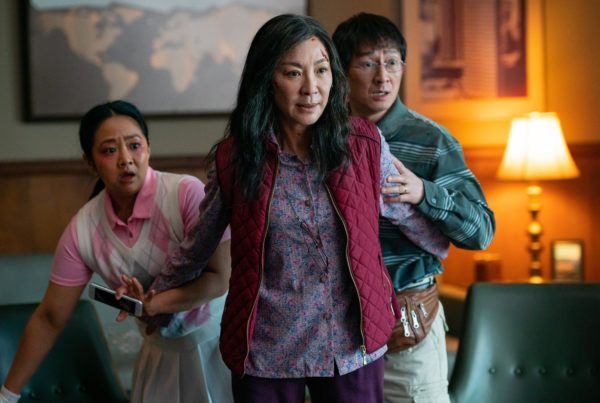Family, friends and allies gathered for a candlelight vigil on a recent cold Saturday evening to honor the life of Cypress Ramos, a Lubbock trans woman murdered last month.
Her girlfriends described Ramos as the life of the party. Always down for a good time, the 21-year-old carried around a fanny pack full of makeup and loved to hype up others.
Like her friend, Desirae Colon, who struggles with her body image.
“I downgrade myself all the time,” she said. “But she would always say ‘Girl, you’re beautiful. Wear that. I’ll do your makeup, I’ll do your hair.’”
Colon said her friend helped her build confidence. Whether she knew it or not, she helped other people with that, too.
Victoria Wynter only really knew Ramos through social media. Wynter said she transitioned at an older age and is inspired by younger generations of trans people, like Ramos, who are unapologetically themselves.
“It’s bravery that guided her through her story, through her transition,” Wynter said. “We should honor that.”
The loss of Ramos has deeply affected the Lubbock trans community and its allies.
“To hear that we have lost somebody who was a member of our trans community in such a manner is not what you would ever expect,” Topher Covarrubio said.
Covarrubio is with a local chapter of the League of United Latin American Citizens (LULAC), called Power of 3 – Unity, Community and Equality that specifically focuses on LGBTQ issues and support. He said conservative Lubbock has felt more welcoming to the LGBTQ community in recent years, but Ramos’ death reminds him there is a long way to go. Hateful comments filled social media posts about the murder case.
Ramos’ body was found in a burning storage unit on Feb. 12, according to the Lubbock Police Department. She was killed by blunt force trauma. Allan Montemayor, 32, was arrested soon after and has since been indicted by a grand jury for murder. He claims he was acting in self-defense and that a song told both him and Ramos to kill one another.
The two knew each other prior to that day. The Lubbock Police Department said there is no indication Ramos was killed because of her identity.
Still, Rachel Hill with LGBTQ advocacy group Equality Texas said people like Ramos are too often the targets of violence.
“Everybody deserves to be able to live without fear, right? But for transgender folks in Texas, particularly black and brown women, that’s really hard,” Hill said. “Since 2017, about 10% of anti-transgender fatal violence has been in Texas.”
In 2021, at least 47 transgender or gender non-conforming people were killed by violence — 5 of whom were Texans. The state consistently sees one of the highest rates of violence against transgender people in the country.
According to the Transgender Law Center, of the 14 trans and non-binary homicide victims tracked in Texas between 2017 and 2020, all but one person was between the ages of 20 and 30. The majority were Black or Latinx. Adding to that, Hill said attacks are often perpetrated by someone the victim knows.
Still, Hill said gender identity is not protected under hate crime laws in Texas. There are federal laws in place and nearly two dozen states also have these protections. This is one issue Hill said Equality Texas advocates for each legislative session.
But according to Hill current politicians seem more focused on laws that she said create a culture of fear of transgender Texans. Gov. Greg Abbott and Attorney General Ken Paxton’s recent calls for the Texas Department of Family Protective Services to investigate families who provide gender-affirming healthcare as child abuse is the latest example of that, Hill said. That directive is not legally binding, but she said it is scary and speaks to a larger concern.
“You hear what’s going on at the Capitol, and you see people look at you funny, and you experience this discrimination. And then someone dies, someone is murdered,” Hill said, referencing Ramos. “It all of a sudden makes all of those fears so much stronger. It’s no longer just dealing with discrimination, but you now have a very visceral sense of what that can escalate to.”
That’s how Victoria Wynter said she felt at the candlelight vigil for Ramos. Even though the murder is not classified as a hate crime, she said she still feels like her community is under attack.
“What happened to her is not just domestic violence. It’s crime against our community,” Wynter said. “It’s not right.”
At the end of the candlelight vigil, mourners were encouraged to live like Ramos — guided by fun and love.
Have a news tip? Email Sarah Self-Walbrick at saselfwa@ttu.edu. Follow her reporting on Twitter @SarahFromTTUPM.














